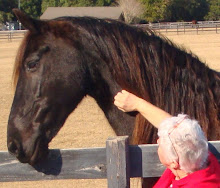The Episcopal Church, long known for its ability to take the Via Media (the middle road), is now in a position of contradicting itself through actions at the just-ended General Convention, the national gathering. Here in the US, the Episcopal Church is probably one of the more liberal churches, but in the Anglican Communion, the international communion of churches united by belief in Jesus Christ and use of a Book of Common Prayer, the Episcopal Church is very radical.
In the past few years, we have offended many of the more conservative Anglican churches, especially those in the Far East and in Africa by our ordination of women to the priesthood and their subsequent consecration to the episcopate. In 2003, we confirmed the election of and consecrated a gay priest who was in a committed relationship with another man. This action brought responses from around the world, and one of those responses was the Windsor Report, a report on the unity of the Anglican Communion, including a request that the Episcopal Church in the US not ordain nor consecrate any more homosexuals. This report also set forth a need for an Anglican Covenant, a way that we all could agree on what put us in communion with one another. Mind you, we've functioned for hundreds of years without such a covenant, and we've held diverse opinions about slavery and segregation, divorce and remarriage, out-of-wedlock children, baptism, holy eucharist, and the participation of women in the church. The report recommended that the Archbishop of Canterbury become, in essence, the Anglican Pope. At the same time, it proposed a listening process that would help the disagreeing churches remain in communion with one another.
Some churches withdrew from communion with the US anyway and have invaded the US with opposing Anglican bishops forming new churches. We need more churches; so making new churches is a good thing. Taking people from one church and forming another raises issues of "what happens to those left behind", property ownership and usage, and communion.
This 2006 General Convention studied the Windsor Report and proposed three major resolutions to be voted upon by the bishops, priests and lay people who represent the various dioceses of the Episcopal Church. Two of these resolutions passed without much debate or controversy: to participate in the forming of an Anglican Covenant and reaffirming "the abiding commitment of the Episcopal Church to the fellowship of churches that constitute the Anglican Communion and to seek to live into the highest degree of communication possible."
The controversy came with the resolution banning the ordination or consecration of homosexuals. The House of Deputies (priests and laypeople) rejected this resolution. The Presiding Bishop called a meeting of the joint houses of Bishops and Deputies. At that meeting he proposed a substitute resolution, which was subsequently passed by both houses. This resolution calls on bishops and Standing Committees to "exercise restraint by not consenting to the consecration of any candidate to the episcopate whose manner of life presents a challenge to the wider church and will lead to further strains on communion."
Okay, so we haven't fulfilled all the requests of the Windsor Report, but we have passed three major resolutions, the last of which is still creating controversy. What I don't understand is how this General Convention could elect a woman as Presiding Bishop and approve a man, who is twice divorced and three times married, for consecration as a bishop. These actions are contrary to the resolve not to present a challenge to the wider church or lead to further strains on communion. The African churches heartily disapprove of divorce and remarriage and most of them don't ordain women.
A group of liberal bishops have dissented from the last resolution, which is not binding anyway. I suspect the most conservative bishops want to do the same thing because they wanted more compliance with the Windsor Report's requests. Liberal church and religious organizations have cried "foul" because this action puts unity ahead of justice. It's almost like the "separate but equal" proposals for desegration in the South some years ago.
Perhaps justice in such matters as sexual preference are easier to discern when you're not struggling so desperately with hunger, AIDS, famine, war, and national unrest. The Episcopal Church in the USA is, overall, very wealthy and contributes much to the alleviation of these cries for help all over the world. But, we don't struggle much with such things in our own congregations; we have the safety to worry about treating all people equally. Jesus helped the marginalized people and he commanded us to feed the hungry, tend the sick and care for the dying. He also commanded us to seek peace and unity.
I don't know how to resolve my own conflict over the unity of the Anglican Communion and the justice of allowing all God's people to participate equally. I don't want to see our church cast out of the Anglican Communion, but I definitely believe that, in the United States, we are ready to move forward with justice and full participation for all people. Hosea said, "Do Justice, Love Mercy, and Walk Humbly with Your God." No one said to preserve unity at the cost of justice or mercy. So, if I have to choose between unity and justice, I'll choose justice.
Thursday, June 22, 2006
Subscribe to:
Post Comments (Atom)

No comments:
Post a Comment